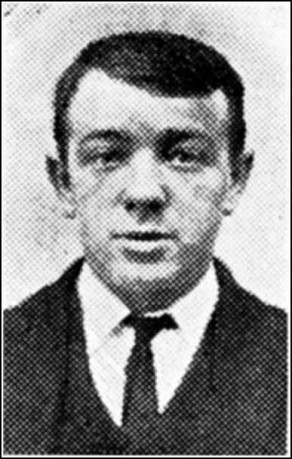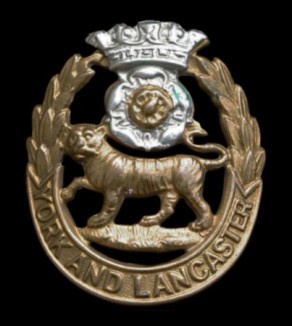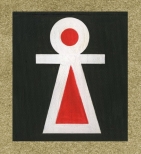08 March 1918
SKIPTON CORPORAL’S DEATH PRESUMED
Corporal Arthur Hebden, West Riding Regiment, whose wife lives at 30 Bennett Street, Skipton, is now officially presumed to have been killed on May 3rd last, since when he has been missing. Formerly a weaver at Messrs. Anderson Bros., Corporal Hebden was 27 years of age, and had been in France since February 1917. His brother, Private James Hebden, York and Lancaster Regiment, has been missing since November last, and another brother, Driver Jack Hebden, R.F.A., is in France.
10 October 1919
HEBDEN – In loving memory of our dear son and brother, Pte. James Hebden, 6th York and Lancs., presumed killed October 9th, 1917.
“Those who hove lost understand best war’s bitter cost.”
From Mother, Sisters, and Willie, 35 Castle Street, Skipton.
23 March 1923
ODDFELLOWS’ WAR MEMORIAL
UNVEILING CEREMONY AT A SKIPTON LODGE
OVER 200 WHO SERVED
There was a large attendance of local members of the Independent Order of Oddfellows at the Friendly Societies’ Hall, Skipton, on Saturday afternoon, on the occasion of the unveiling of a war memorial to the members of the Loyal Traveller’s Friend Lodge, I.O.O.F, M.U., who fell in the war.
The Memorial takes the form of a beautifully designed scroll within an oak frame with a glass front, the work of Mr. H. Spencer, junr., and it bears the inscription:–
LOYAL/TRAVELLER’S FRIEND LODGE,/SKIPTON DISTRICT ./I.O.O.F. ROLL OF HONOUR M.U./OF/THOSE MEMBERS OF THIS LODGE WHO FOUGHT FOR THEIR KING AND COUNTRY TO UPHOLD THE SACRED CAUSES OF BROTHERHOOD AND HUMANITY IN THE GREAT WAR, 1914–1918.
Below the inscription are the names of 173 members who served in the war, and of the 40 members who were killed. The names of the fallen occupy a central position on the scroll, and above them are the following words:–
IN MEMORIAM
OF THOSE WHO MADE THE
SUPREME SACRIFICE.
THEIR HEARTS ARE LIFTED UP
THEIR HEARTS
THAT HAVE FOREKNOWN
THE UTTER PRICE,
THEIR HEARTS BURN
UPWARD AS A FLAME
OF SPLENDOUR AND OF
SACRIFICE
The names of the fallen are as follows:– H. Armstrong, J.J. Brown, J. Barrett, Robt. Brown, W.W. Bell, A. Clayton, W.H. Coles, T.C. Chew, Tom Downes, T.M. Drummond, Jos. Emmott, Thos. Edmondson, J. Easterby, F. Gallagher, J.W. Garwood, G.E. Godwin, S.J. Hargreaves, M. Hargreaves, A. Hebden, J. Hebden, A. Hawkswell, T.E. Inman, M. Lund, R.C. [R.G.] Metcalfe, Hbt. Maudsley, Hy. Maudsley, A.J. Pimnock [Pinnock], H.Y. [Harry] Riley, T.W. Storey, J.H. Stewart, R. Spencer, J.W. Shuttleworth, Wm. Tempest, Hbt. Thompson, Fred Thornton, J.W. Varley, John Ward, J.A. Whittaker, J.W. Whittaker, and R.D. Whittaker.
The Unveiling Ceremony
The unveiling ceremony was presided over by Bro. Thos. Bellamy, and was performed by Bro. Amos Culpan, Prov. C.S., and a simple service included the singing of the hymns, ‘O God our help’ and Kipling’s Recessional, ‘God of our fathers,’ and the reading of a portion of Scripture, and the offering of a prayer by Bro. James Greenwood, of Bradford, and formerly of Skipton.
Bro. Bellamy observed that those members of the Lodge whom they were met to honour went into battle, suffered untold privations, and, in many cases, made the supreme sacrifice. They gave their lives in defence of their homes and their country. Further than that, they gave their lives for justice and freedom, and in order that we might live. It was the duty of Oddfellows, equally as much as other sections of the community, to do everything within their power to make the country better for that sacrifice. “In the time of our prosperity,” concluded Bro. Bellamy, “never let us forget those who served us in the time of our adversity.”
A Lesson of the War
Prior to unveiling the memorial, Bro. Culpan described the ceremony he had been asked to perform as one not unattended by sorrow. It was an occasion upon which one felt a desire to make their Order better for the sacrifice of its members, and to extend the true spirit of brotherhood. In nearly 4,000 of their Lodges they would find a roll of honour. Over 22,000 of their members made the supreme sacrifice, and thousands of others were ruined and shattered in health and without prospects for the future. Each and all of them ought to perform some daily service that would make the sacrifice of those men worth while. One result of the terrible ordeal of 1914 to 1918 was the creation of a better feeling between men, and a desire to break down the class barriers that formerly existed. That was one of the great lessons of the war.









No comments yet.